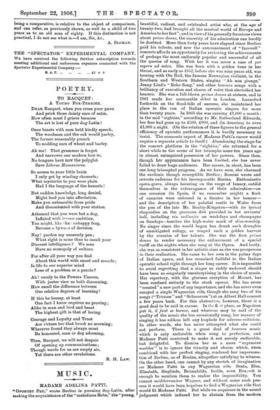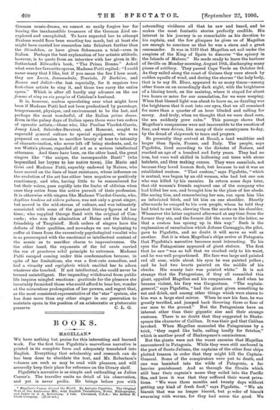MUSIC,
MADAME ADELINA PATTL " OPORTET Pati," wrote Berlioz in punning dog-Latin, after making the acquaintance of the "melodious }Labe," the" young,
beautiful, radiant, and celebrated artist who, at the age of twenty-two, had brought all the musical world of Europe and America to her feet"; and in view of his generally ferocious views about prime donne, the sincerity of his admiration can hardly be doubted. More than forty years have elapsed since Berliez paid his tribute, and now the announcement of "farewell" concerts affords an opportunity for reviewing the achievements of perhaps the most uniformly popular and successful of all the queens of song. With her it was never a case of per aspera ad asira. She was born with a golden tune in her throat, and as early as 1852, before she was nine years old, was touring with Ole Bull, the famous Norwegian violinist, in the Southern and Western States, singing " Ah non giunge," Jenny Lind's "Echo Song," and other bravura songs with a brilliancy of execution and charm of voice that electrified her hearers. She was a full-blown prima donna at sixteen, and in 1861 made her memorable data in London. Launched forthwith on the flood-tide of success, she maintained her place in the van of Italian operatic singers for more than twenty years. In 1863 she was earning £1,000 a mouth : in the mid "eighties," according to Mr. Sutherland Edwards, her fees had gone up to £500, £800, and (in America) to even £1,000 a night. (On the relation of these figures to the general efficiency of operatic performances it is hardly necessary to insist. The economic aspect of Madame Patti's career would require a separate article to itself.) Abandoning the stage for the concert platform in the "eighties," she returned for a short while to the scene of her triumphs some ten years ago in almost unimpaired possession of her powers. Since then, though her appearances have been limited, she has never failed to draw huge audiences. Her career, in short, has been one long triumphal progress. As we have seen, she charmed the sardonic though susceptible Berlioz ; Rossini wrote and rewrote cadenzas for his incomparable Rosins,. Enthusiastic opera-goers, always hovering on the verge of lunacy, outdid themselves in the extravagance of their admiration—on one occasion (in Spain, if we remember aright) a flock of canaries were unloosed in a theatre in her honour— and the description of her palatial castle in Wales from the pen of the late Mr. Beatty-Kingston—with its lyrical rhapsodies on the generous diet provided in her servants' hall, including sin ordinaire on weekdays and champagne on Sundays—touches the high-water mark of diva-worship. No singer since the world began has drunk such draughts of unmitigated eulogy, or reaped such a golden harvest by the exercise of her talents. She was the first prima donna to render necessary the enforcement of a special tariff on the nights when she sang at the Opera. And lastly, she was as consistent in her artistic aims as she was prosperous in their realisation. She came to her own in the palmy days of Italian opera, and has remained faithful to the Italian operatic school right through her long career. It is impossible to avoid regretting that a singer so richly endowed should have been so singularly unenterprising in the choice of music. Her repertory, with the glorious exception of Mozart, has been confined entirely to the stock operas. She has never "created" a new part of any importance, and she has never even essayed a single Wagnerian role, though she sang two of his songs (" Trauma " and " Schmerzen") at an Albert Hall concert a few years back. For this abstention, however, there is a good deal to be said in excuse. In the 6.1.st place, as Napoleon put it, il faui as borner, and whatever may be said of the quality of the music she has occasionally sung, her manner of singing it has seldom left any loophole for adverse criticism. In other words, she has never attempted what she could not perform. There is a great deal of bravura music which is only endurable when sung to perfection, and Madame Patti contrived to make it not merely endurable, but delightful. To dismiss her as a mere "expensive warbler" is to ignore the vivacity and charm which, when combined with her perfect singing, rendered her impersona- tion of Zerlina, as of Rosina, altogether satisfying to witness. On the other hand, one cannot by any stretch of imagination see Madame Patti in any Wagnerian role. Senta, Elsa, Elisabeth, Sieglinde, Brannhilde, Isolde, even Eva,—it is enough to mention them to realise the impossibility. You cannot mediterraniser Wagner, and without some such pro- cess it would have been hopeless to find a Wagnerian role that would fit Madame Patti. But while we acquiesce in the sound judgment which induced her to abstain from the modern German music-drama, we cannot so easily forgive her for leaving the inexhaustible treasures of the German Lied un- explored and unexploited. To have expected her to attempt Brahma would save been exacting too much, but at least she might have carried her researches into Schubert further than the Standchen, or have given Schumann a trial—even in Italian. Perhaps the best explanation of her artistic attitude, however, is to quote from an interview with her given in Mr. Sutherland Edwards's book, "The Prima Donna." Asked what were her favourite operas, Madame Patti replied: "I could name many that I like, but if you mean the few I love most, they are Lucia, Sonnambula, Traniata, Ii Barbiere, and Romeo and Juliet—the last especially, for it requires two first-class artists to sing it, and those two carry the entire opera." Which is after all hardly any advance on the ma femme et cinq ou six poupges of Catalani's husband.
It is, however, useless speculating over what might have been if Madame Patti had not been predestined by parentage, temperament, physique, and environment to be the last, and perhaps the most wonderful, of the Italian prime donne. Even in the palmy days of Italian opera there were two orders of operatic artists,—those who, like Pauline Viardot-Garcia, Jenny Lind, Schroder-Devrient, and Ronconi, sought to superadd general culture to special equipment, who were prepared on occasion to sacrifice beauty of tone to intensity of characterisation, who never left off being students, and, to use Watts's phrase, regarded all art as a serious intellectual utterance. And there have been, on the other hand, the great singers like "the unique, the incomparable Banti" (who bequeathed her larynx to her native town), like Mario and Grisi and Madame Patti, superbly endowed by Nature, who have moved on the lines of least resistance, whose influence on the evolution of the art has either been negative or positively reactionary, and who, having little to be remembered for but their voices, pass rapidly into the limbo of oblivion when once they retire from the active pursuit of their profession. It is otherwise with singers like Madame Viardot-Garcia, who, duplices tendens ad sidera palmas, was not only a great singer, but moved in the mid-stream of culture, and was intimately associated with some of the greatest literary figures of her time ; who supplied George Sand with the original of Con- suelo ; who won the admiration of Heine and the lifelong friendship of Turgenieff. Both orders of singers have the defects of their qualities, and nowadays we are beginning to suffer at times from the excessively psychological vocalist who is so preoccupied with the emotional or intellectual content of the music as to sacrifice charm to impressiveness. On the other hand, the exponents of the bel canto carried the vox et praeterea nihil principle to extremes. Madame Patti escaped coming under this condemnation because, in spite of her limitations, she was a first-rate comedian, and bad a vivacity and espieglerie which enabled her to adorn whatever she touched. If not intellectual, she could never be termed unintelligent. Her impending withdrawal from public life inspires mingled emotions : gratitude for the pleasure she invariably furnished those who could afford to hear her, wonder at the miraculous prolongation of her powers, and regret that, as the most consistent representative of the" star" system, she has done more than any other singer in our generation to maintain opera in the position of an aristocratic or plutocratic







































 Previous page
Previous page